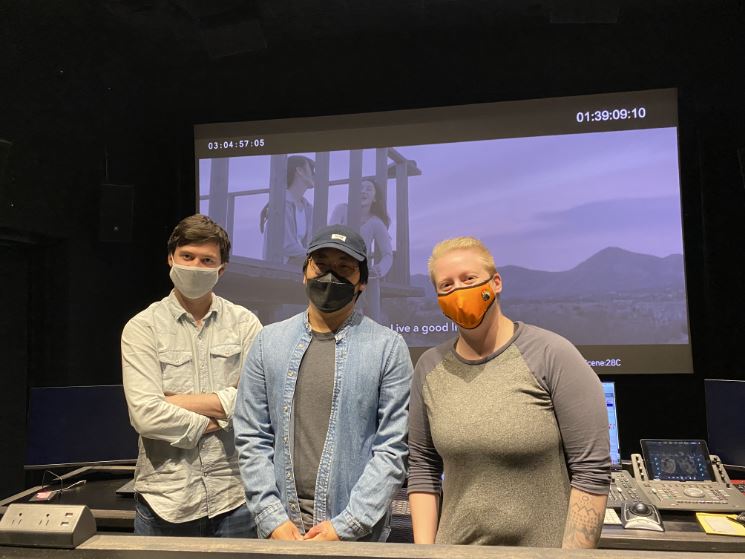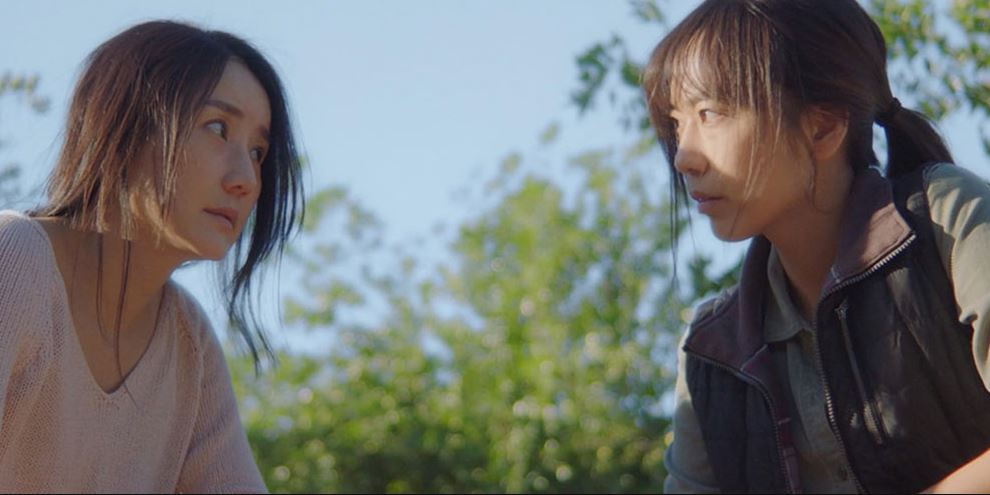
L TO R: COMPOSER ALEX WINKLER, DIRECTOR/WRITER YOUNG MIN KIM, SOUND DESIGNER CHRISTINA GONZALEZ
DAWNING is about trauma, a common thread in recent popular thrillers. The manifestation of the protagonist’s mind may come out as violent, gory, or straight up chilling. Admittance of an experience might be a big step, but it’s not the only step. Unpacking it is another huge game. Haejin (Kim Ellis) is a trauma therapist who gets flashbacks of her father getting into his truck and dying by suicide. Perhaps Haejin needs definitive closure or words to describe how she feels, but she pushes it away despite episodes of sleep paralysis and nightmares. She returns to her family’s farm in California after her sister Soojin (Veronica Park) breaks up with her boyfriend. From the get-go, we can feel that something is just not right. Young Min Kim, who has primarily worked in visual effects for The Batman, Spider-Man: No Way Home, and The Forever Purge, shares his connection to the story and portrayal of the Korean American experience on screen.
This conversation has been edited for flow and clarity. Spoilers ahead.
BOSTON HASSLE: I know that this movie is marketed as a psychological thriller drama, but I found it scary enough to mentally categorize it as horror. Maybe you can speak to parts of the movie, but how did you decide to use horror as the narrative vehicle for trauma?
YOUNG MIN KIM: When we first set out to make Dawning, I didn’t really want to make it a horror film because I didn’t want to categorize trauma with horror, necessarily. But as I was writing and when we eventually got to filming it, it became the easiest way to showcase and portray what people feel during episodes of mental illness– like sleep paralysis, for example. It was also the easiest way for me to deliver an experience and the easiest way to swallow it through the genre of horror.
BH: When I watch a horror movie, there’s usually a certain image or frame that sets the tone or scare factor for the rest of the movie. For this one, when we were in Haejin’s office, there was Kim Ellis’s face in the corner, and then there was this painting on the wall that was creepy looking. I wanted to know where that painting came from.
YMK: This was a very indie budget film. I quickly realized that getting sort of image clearance is an expensive, long process. One of the biggest things with a smaller picture and not having the resources of a big production design budget is that you don’t want white walls to surround your set. I had a conversation with my production designer and said we needed to figure out some sort of artwork situation that portrays the mind of this character and have it also be ambiguous. The easiest way to do that was to buy a bunch of canvases and throw paint on it. I tried to represent what was going on with Haejin’s mind. All of the paintings that you see in the film was created by me; I spent a weekend throwing paint and being as artistic as I can. It turned out pretty terrifying-looking. That painting’s tucked away somewhere in my house.
BH: I watched this movie twice and on the second take, I realized it was foreshadowing.
YMK: I’m glad that got across. A lot of people said that it looked like a volcano, which is fine. It was supposed to look more like the back of someone’s head. But if it looks like a volcano, great. It could be her mind erupting.
BH: I know you didn’t want to categorize this as a horror film, but I think you were able to capture another creepy feeling when you had the sister, Soojin, digging so absurdly and abnormally in broad daylight. I know your background is in visual effects. When you approached Dawning, did you draw inspirations on how you wanted it to look like?
YMK: My favorite film that I referenced for this project was A Tale of Two Sisters. This movie definitely takes a lot of inspiration and reference from that film. For me, I wanted to make a film that terrified me when I was a child and put my own twist on it. Now that you mentioned about bringing horror to broad daylight, I think Midsommar was a big one. We can scare the shit out of people at 12 in the afternoon.

L TO R: Kim Ellis (Haejin) and Veronica Park (Soojin)
BH: How did you decide to write it from the perspective of a sister?
YMK: I wanted to portray the horror and main trauma coming from witnessing someone else’s trauma. Big spoiler, but the heart of the story was when the sister was being physically abused and eventually kills herself. The person who is in closest proximity to her is Haejin. By witnessing her younger sister’s suicide, she gets secondhand trauma.
A lot of people have asked me “What happened?” after they saw the movie, so I should say this: my parents have a great relationship, and it’s nothing like what’s portrayed in the story. I went to film school at USC and, as a student trying to become a director of some sort, you start branching out to friends to see what stories they have and what you can possibly bring to light. There was a period in my life, which I noticed was around the same time as the #MeToo movement, when a lot of female friends were vocal about their past traumas specifically related to family. I got — I don’t want to say inspiration — a lot of energy from that time and I wanted to portray what a lot of my friends were or are going through. As a male, I know I don’t have the full experience of what women have gone through. But I felt like there was a story that was so captivating and that was the story I ultimately came to.
BH: Where did you film this movie? It looked like a large area of land.
YMK: It was at my grandparents’ farm. We had three locations, but 70% of the film was set at the farm. It’s near Barstow in California. Nothing around, just land and farmers doing their thing.
BH: I’m always fascinated by when you have to craft a dialogue between two bilingual characters. For English-speaking audiences, our ears are more attuned whenever we hear the English phrases in between. I remember when the sisters are having an intimate conversation and Haejin says, “It’s not your fault” in English and felt like that was perfectly placed. I also find that when people use English for phrases, it might be because we don’t know it in the other language, which gave it a deeper meaning to that line. Did you think about what things you wanted to be said in English and Korean?
YMK: I’m considered a 1.5 generation Korean-American. My Korean is passable for conversation, but the moment it enters any sort of professional conversation I gotta get out because I don’t know how to phrase certain things or the words to describe my feelings. I definitely noticed that there are certain words in Korean that are deeper and richer in context than a simple sentence in English.
BH: Kim and Veronica seemed very fluent in Korean. Did they help with the dialogue?
YMK: Kim is, I think, the most proficient in Korean among everyone on set. Except for the parents, they did not speak English. There were a lot of parts when we were going through the script and she’d say, “Hey, there’s a couple of lines that I think would be better if we said it in Korean.” That was important feedback for me because I wrote the script in a way that I can digest it. For her, she felt that there was more meaning and richer ways to say something in Korean. I definitely had a lot of back-and-forth with Kim and Veronica.
BH: After a hand in directing, writing, and working in visual effects, is there a role that feels more instinctive to you?
YMK: I’ve made a couple of short films in college and a bit after that as well. This started as a short film and eventually became a feature film halfway through, even though it wasn’t supposed to be my first feature. I don’t think I put a lot of thought into what the next step is going to be. After we wrapped up this film, I was trying to figure out what to direct for the next project. I think directing comes a bit more naturally. Writing is hard. (laughs) It’s a muscle.
Dawning
2022
dir. Young Min Kim
73 mins
Part of the 2022 Boston Asian American Film Festival. DAWNING will be playing on Friday, October 21 @ 8:30 PM at the Emerson Paramount Center. Director/writer Young Min Kim will be in-person for a Q&A after the screening.

